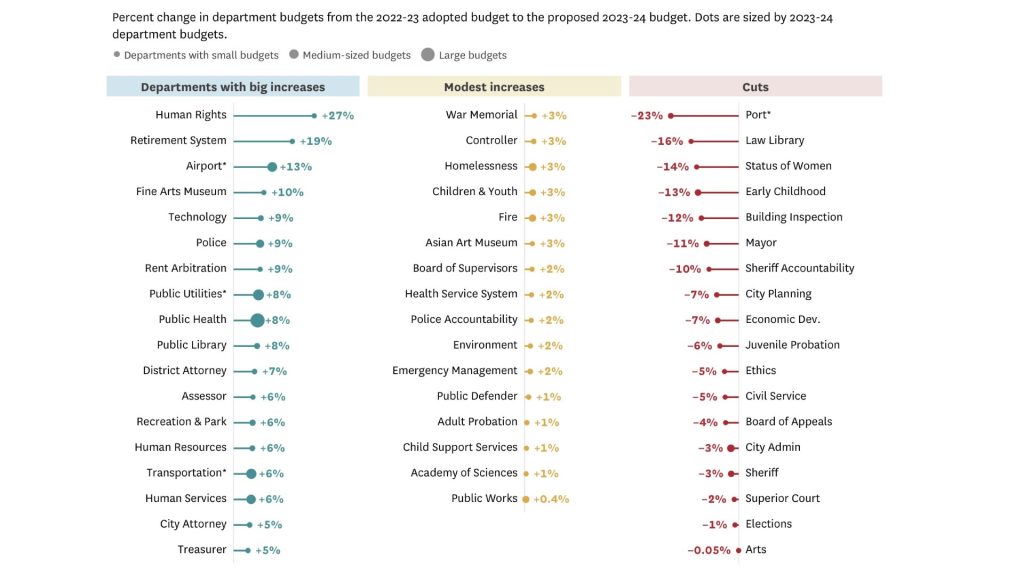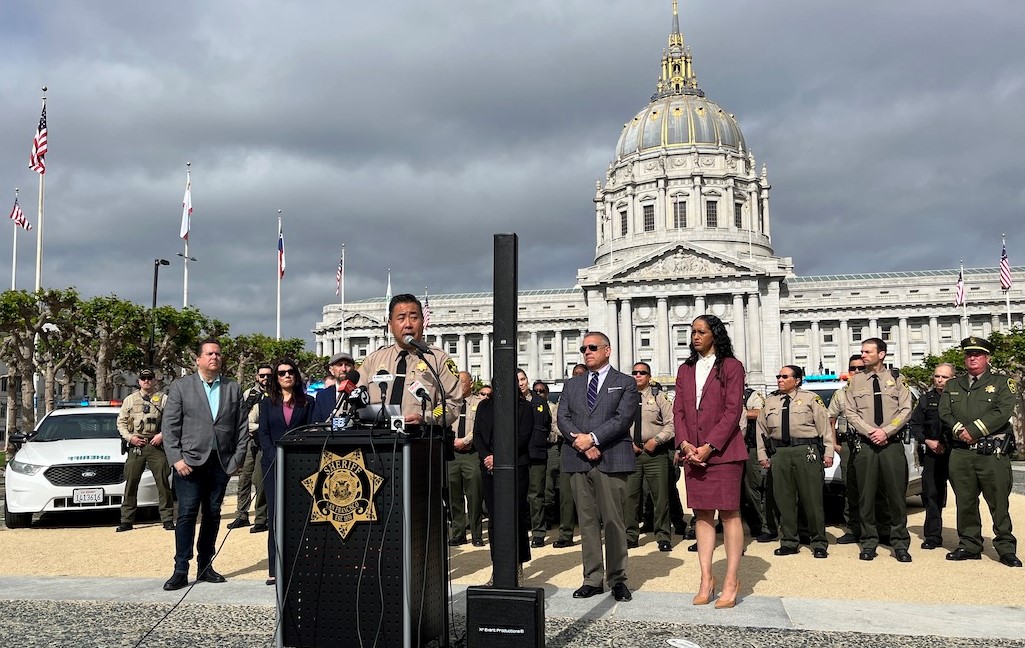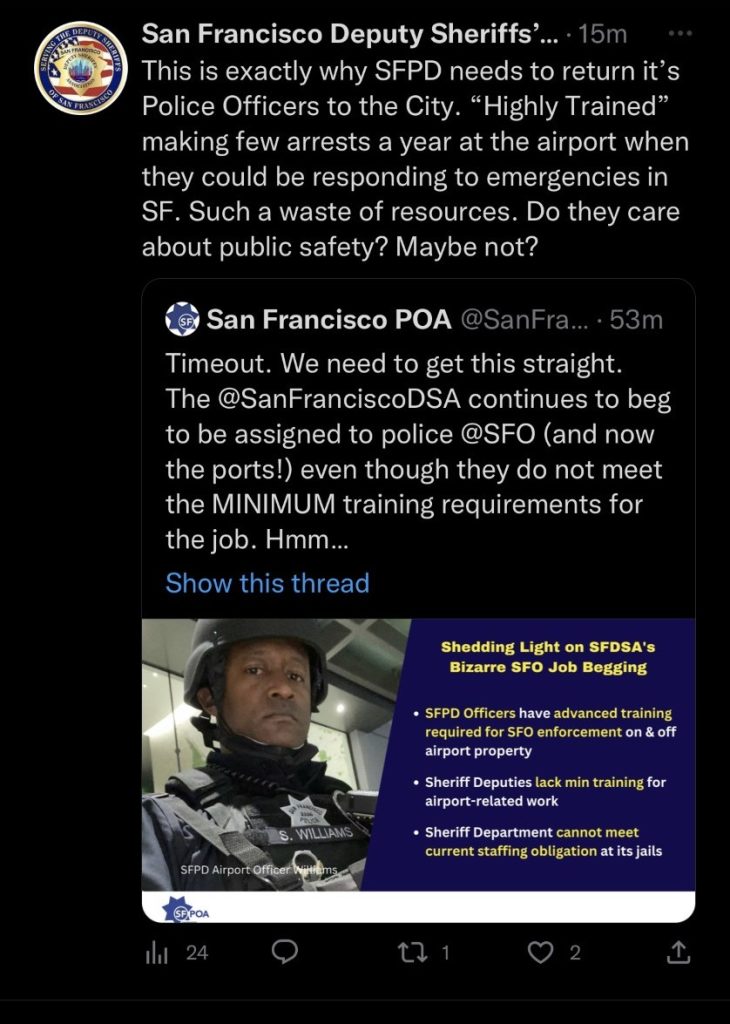FOR IMMEDIATE RELEASE
 Mayor London Breed’s strategic defunding of the Sheriff’s Department in San Francisco has ignited concerns among law enforcement officials and citizens alike. Operating under the radar, these silent defunding measures, such as the denial of the longevity incentive proposal on May 15th, 2023, and disproportionate budget cuts, are adversely impacting the department’s staffing levels and compromising public safety. Let’s examine these covert actions and their potential ramifications on the Sheriff’s Department.
Mayor London Breed’s strategic defunding of the Sheriff’s Department in San Francisco has ignited concerns among law enforcement officials and citizens alike. Operating under the radar, these silent defunding measures, such as the denial of the longevity incentive proposal on May 15th, 2023, and disproportionate budget cuts, are adversely impacting the department’s staffing levels and compromising public safety. Let’s examine these covert actions and their potential ramifications on the Sheriff’s Department.
Denial of Longevity Incentive Proposal
One glaring example of Mayor Breed’s covert defunding strategy is the denial of the longevity incentive proposal. On May 15th, 2023, Mayor Breed rejected this proposal aimed at retaining experienced deputies eligible for retirement, and she also failed to come to the table with a counter proposal or offer any alternative ideas to address the issue. This lack of engagement and proactive effort from the mayor demonstrates a concerning disregard for the retention of deputy sheriffs and exacerbates the ongoing staffing crisis within the Sheriff’s Department. The loss of 50 to 110 deputies due to early retirement further strains the department, leading to increased workloads, reduced efficiency, and compromised public safety.
Budget Cuts and Disproportionate Allocation
Mayor Breed’s budget decisions further illustrate her covert defunding tactics. While slashing the Sheriff’s Department budget by 3%, the mayor simultaneously increased the budgets of other public safety departments, such as the police by 9% and the fire department by 3%. This disproportionate allocation sends a troubling message about the mayor’s priorities and undermines the Sheriff’s Department’s ability to effectively carry out its duties.
Unused Funds and Overtime Reduction
The mayor’s claim of utilizing unused funds from vacant positions and reducing overtime within the Sheriff’s Office raises questions about the allocation of resources. If these funds were available, they could have been redirected to support initiatives like the longevity incentive proposal, thereby mitigating staffing shortages and reducing the need for overtime. However, the failure to do so implies a disregard for the long-term sustainability of the department and places an unnecessary burden on the existing workforce.
Implications for Public Safety and Financial Efficiency
The consequences of Mayor Breed’s covert defunding tactics extend beyond understaffing. Insufficient staffing levels compromise response times, limit the department’s ability to proactively address emerging challenges, and hinder the delivery of essential services to the community. Moreover, the reliance on overtime to fill vacant positions not only strains the budget but also places an additional burden on the dedicated deputies who shoulder the increased workload.
A Call for Accountability and Transparency
In light of these concerning developments, it is crucial for concerned citizens, deputies, and community stakeholders to hold Mayor London Breed accountable for her silent defunding strategies. The Sheriff’s Department plays a vital role in maintaining public safety, and it deserves the necessary resources and support to fulfill its duties effectively.
Additionally, transparency and open dialogue are imperative in addressing these budgetary concerns. Citizens must demand clear explanations and justifications for the disproportionate budget cuts and the denial of proposals aimed at retaining experienced deputies. By fostering transparency, the community can actively participate in shaping a fair and effective criminal justice system that prioritizes public safety.
Mayor London Breed’s covert defunding tactics targeting the Sheriff’s Department in San Francisco have serious implications for public safety and the well-being of the community. The denial of the longevity incentive proposal on May 15th, 2023, without offering any alternative solutions, and the disproportionate budget cuts jeopardize the department’s staffing levels, hindering its ability to maintain law and order effectively. It is essential for citizens and stakeholders to voice their concerns, demand accountability, and advocate for the allocation of resources that align with the department’s needs. Only through open dialogue and collaborative efforts can we ensure a robust and secure future for the Sheriff’s Department and the community it serves. By holding Mayor Breed accountable for her silent defunding strategies, we can work towards a fair and effective criminal justice system that prioritizes public safety and upholds the principles of justice and equality.
Media Contact:
Ken Lomba
President
San Francisco Deputy Sheriffs’ Association
415-696-2428






 Mayor London Breed’s strategic defunding of the Sheriff’s Department in San Francisco has ignited concerns among law enforcement officials and citizens alike. Operating under the radar, these silent defunding measures, such as the denial of the longevity incentive proposal on May 15th, 2023, and disproportionate budget cuts, are adversely impacting the department’s staffing levels and compromising public safety. Let’s examine these covert actions and their potential ramifications on the Sheriff’s Department.
Mayor London Breed’s strategic defunding of the Sheriff’s Department in San Francisco has ignited concerns among law enforcement officials and citizens alike. Operating under the radar, these silent defunding measures, such as the denial of the longevity incentive proposal on May 15th, 2023, and disproportionate budget cuts, are adversely impacting the department’s staffing levels and compromising public safety. Let’s examine these covert actions and their potential ramifications on the Sheriff’s Department.
 They first advised the SFSD’s Operation Center at Zuckerberg San Francisco General Hospital to clear a path for an ambulance for the wounded officer
They first advised the SFSD’s Operation Center at Zuckerberg San Francisco General Hospital to clear a path for an ambulance for the wounded officer